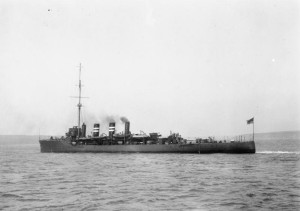In a previous post I mentioned an article which analysed the newspaper reporting of the beginning of the First World War. By happenstance I had begun to read the autobiography of the prolific writer Ursula Bloom – Youth at the Gate – which documents the beginning of the war. The author lived in genteel poverty in St Albans (her mother having left her clergyman father) with her mother and younger brother.
The family were Daily Mail readers and her opening chapters are smattered with references to that newspaper and the developing international crisis. The first sign of the war, “… was recorded in the Daily Mail of June 29th, 1914, when it gave details of the assassination … we received the news fairly calmly … a passing shock was overcome by the comforting reassuring, ‘Thank God that sort of thing couldn’t happen here.’” Her family continued their plans for a holiday: the Isle of Wight or Great Yarmouth? The latter was chosen as they were Norfolk people, and it was far cheaper. She charts the rising international tensions through her observations and the Daily Mail. Reading her observations there seems to be a generational split: the older people are concerned and shocked, the younger excited, “If something happened, then it happened, and it would be fun to get us all out of our rut”.
Holiday preparations continued with the packing of trunks. The British fleet left Portland and her mother blamed that, “… awful Mr. Winston Churchill … Somebody ought to stop that silly young man …” Bloom notes the invasion of Luxemburg but is more interested in the advertisements in the Daily Mail for 1st and 2nd August (hotels in Brighton, and the Papier Poudré beauty item).
She worked as a cinema pianist in Harpenden for 30/- a week (3d off for the insurance stamp). Her working hours were 5.30 to 10.30 and 2.30 to 10.30 on matinees. On bank holidays she began work at 11am. And so it was, in the last few days of peace, she found herself working on the August bank holiday playing any patriotic tune to applause and whistling. Her work in the cinema shows another developing medium, the use of the newsfilm and the use of slides to convey war news. To keep the patrons of the cinema informed about the latest developments and retain the audience, “On the lamp blacked slides latest news was scratched with one of my hairpins, and it was increasingly exciting”. She also relates the newsfilm Pathe Gazette being shown – with pictures of the reserves being called up and a destroyer putting out to see from Harwich – all accompanied by “violent applause from the twopennies”. Later another slide was scratched and displayed saying that Germany still had not replied to the British ultimatum to which the twopennies booed. Goodness knows what the censors would have said if Bloom had continued imparting war news in this manner.
Bloom also recounts how she scratched slides for the siege and fall of Liege (just like the breaking and rolling news of today). Although the cinema owner did not allow the playing of hymns, considering it sacrilege, she played “Through the night of doubt and sorrow” when the slide announcing the city’s fall was shown. Her decision to play the hymn was right as she earned herself a big box of chocolates.
“We were thrilled with the news that HMS Amphion had sunk the German minelayer Königen Luise in British waters. In wild elation I scratched it on the slide, and rushed to the piano, grabbing the keyboard from Mother waiting to greet the announcement with ‘Rule Britannia’. This was the way to win a war! The scanty house rose and cheered to a man!”
The other action that Bloom recorded on the slides was the naval engagement between HMS Amphion and the Königen Luise. The initial slide recorded the sinking of the German ship and then the next day she had to record the loss of Amphion on “my beastly little slides”, as the ship had struck a mine.
Within days of war being declared her fiancé and brother had joined up. Her fiancé then broke off the engagement. The cinema projectionist also enlisted and the commissioner was called up as he was a reservist. Prices shot up and food was hoarded. Her work at the cinema became harder as she had to manage the venue as well as play the piano, all this within the first few weeks of the war. For the rest of the war Bloom fared just as badly. She was accused of being a spy, her mother died of cancer, she witnessed airship raids, and the arrival of casualties. She did marry and had a son. Her army husband survived the war but not the influenza and so, as the war ended, she was left a widow.
Recent articles mirror some of Bloom’s observations about the war. In History Today there is a piece, The Daily Mail and the First World War, by Adrian Bingham. As well as avid readers of the newspapers, the Bloom family bought the Daily Mail war map for 6d. and pinned it on their wall, though her mother, “… was in a continual dither not knowing where to put the next flag.” Catriona Pennell has also written an article, Believing the Unbelievable: The Myth of the Russians with ‘Snow on Their Boots’ in the United Kingdom, 1914. Bloom narrates, “Lots of talk going around”, including the rumour of the Cossacks passing though Harpenden station on darkened trains that had been recognized by, “their fur caps and some had the snow of Siberia still on them!”
And finally, the IHR’s Anglo-American conference for 2014 is entitled The Great War at Home which also covers some of the issues raised by Bloom.

